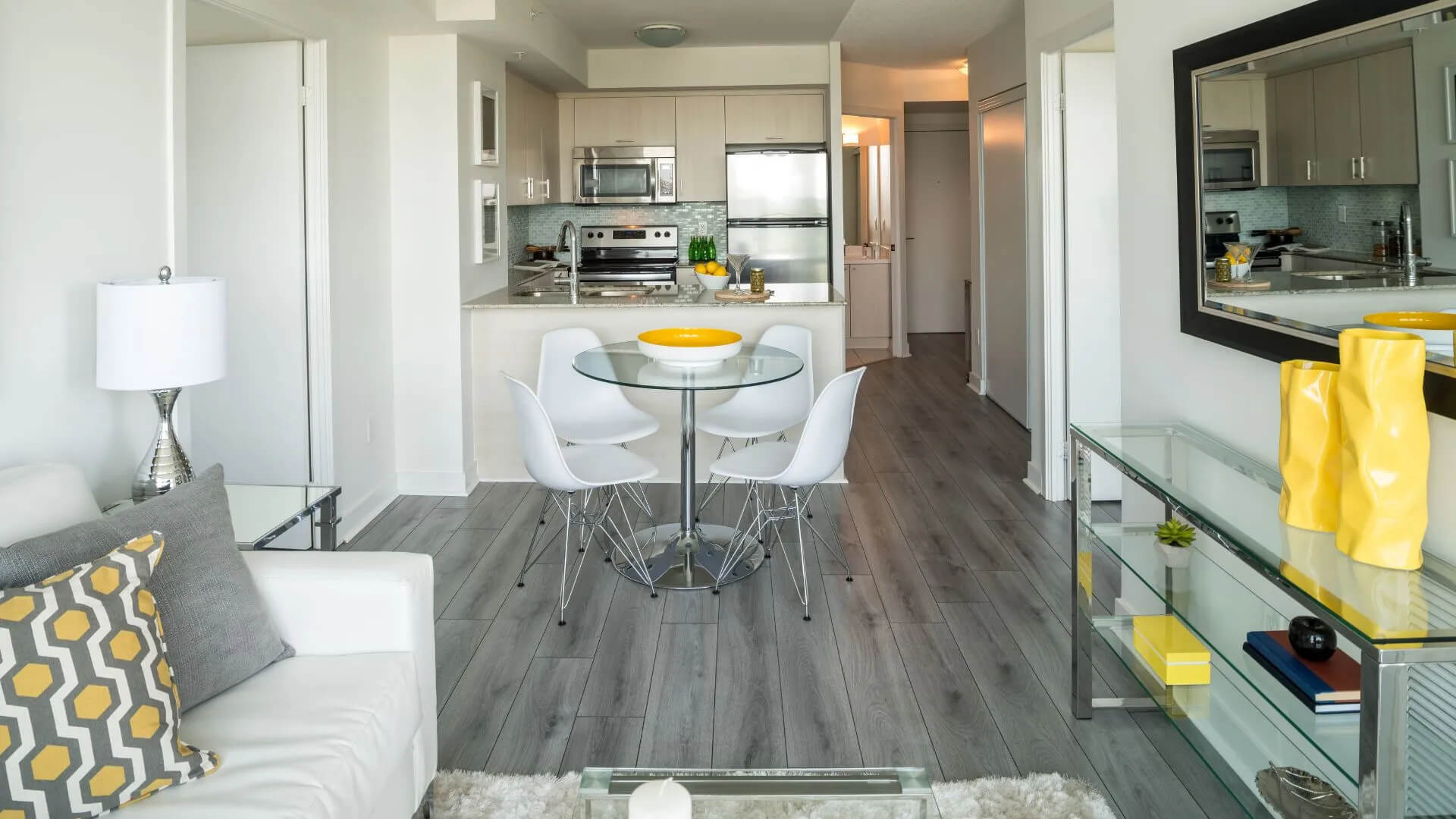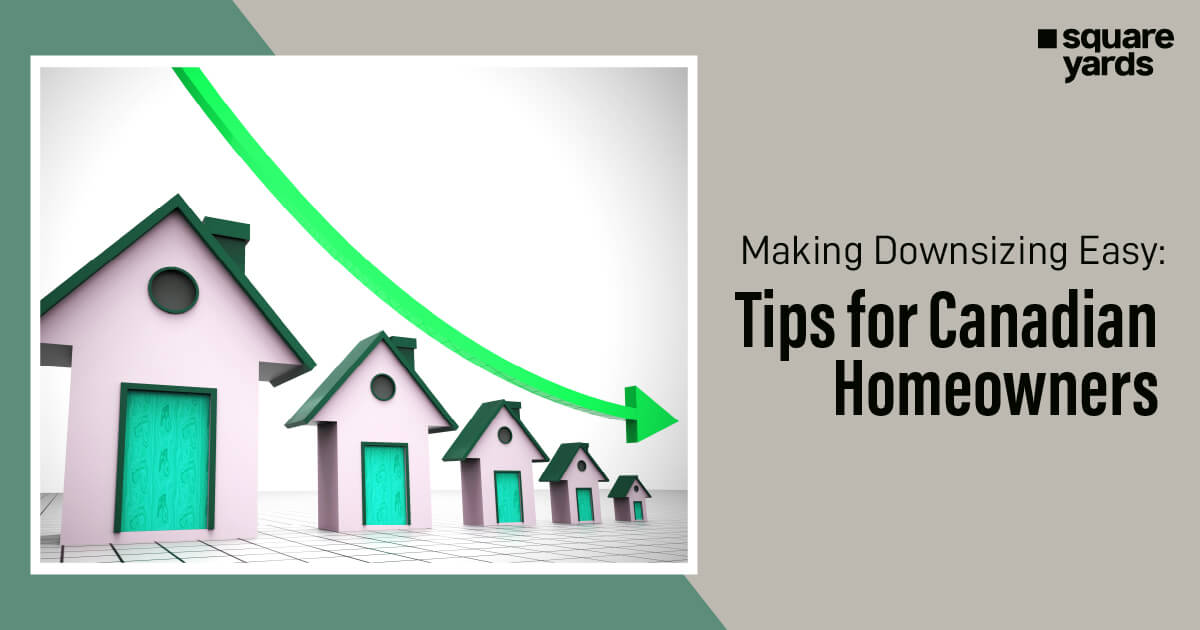Now that the kids have moved out, your house has many empty rooms. Downsizing can help. Moving can be hard, but it can be easier with good planning. This blog will show you how to downsize your home in Canada step by step. You will learn how to decide what to keep, find the right real estate agent, and get your home ready to sell. With these tips, you can move smoothly to a new, smaller home that fits your needs.
Downsize your Home in Canada : An Overview
Choosing to downsize your home in Canada is a strategic decision, especially as maintaining a larger property can take time and effort. Transitioning to a smaller home offers a range of benefits, including easier upkeep and lower heating and utility costs, which can lead to substantial savings. A more compact living space can free up your time, reduce expenses, and provide greater flexibility, ultimately improving your quality of life. Let’s delve into the motivations for downsizing, strategies to prepare for the move, and the options available to facilitate a smooth transition.
Reasons for Downsize Your Home in Canada

Downsizing your home in Canada offers numerous benefits that can greatly enhance your lifestyle, particularly as you age. Opting for a smaller living space can simplify daily routines, reduce expenses, and create a more comfortable living environment. Here are some key reasons to consider downsizing:
Enjoy More Free Time
Opting for a smaller home dramatically reduces the time required for cleaning, yard work, and home maintenance. This shift allows you to spend more time on hobbies, socialising, and leisure activities. With less focus on upkeep, you can concentrate on what truly matters, enhancing your overall quality of life.
Cut Down on Expenses
Downsizing to a smaller home or condo can lead to substantial savings. Lower property taxes, insurance premiums, utility bills, and maintenance costs contribute to reduced overall living expenses. These financial benefits can help you pay off debt, save for retirement, or invest in vacations and new experiences, providing greater economic freedom and flexibility.
Increase Your Flexibility
Downsizing to a smaller home offers new freedoms and flexibility. With less space to manage, homeowners can enjoy more leisure time, extended vacations, or family visits without constant property upkeep worries. Additionally, smaller homes are easier to adapt to changing lifestyles. Owners have greater options to match their evolving needs, whether renting or selling.
Adopt a Simpler Lifestyle
Letting go of unnecessary things creates a calmer, more organised living space. Focus on what truly matters and enjoy the benefits of a minimalist lifestyle. While it’s a big change, the rewards—like lower costs and more freedom—make it worth considering. Careful planning can help you transition smoothly to a smaller, happier home.
Your Guide to Downsizing Your Home

Downsizing is a big step, but with careful planning and a positive mindset, it can be a rewarding experience. Here are some steps that you can follow while downsizing your home:
-
- Declutter and Organise: Start by decluttering your space. Go through each room and decide what to keep, donate, or discard. Focus on items you truly love and use.
- Reimagine Your Space: Evaluate your home’s layout. Can you repurpose rooms or close off unused areas? This step can make your space feel larger and more efficient.
- Pack with Purpose: Pack room by room, starting with items you won’t need immediately. Label boxes clearly for easy unpacking.
- Prepare Your Home for Sale: Give your home a fresh look with a deep clean, minor repairs, and perhaps a coat of paint. Staging can help potential buyers envision themselves living there.
- Explore Your Options: Consider selling your home, renting it out, or exploring retirement communities. Consult with a real estate agent to understand your options.
Effective Tips for Downsize Your Home in Canada

When downsizing, less is truly more. Take a hard look at everything you own and ask yourself if it brings you joy or serves a practical purpose. Be prepared to discard items you last used a year ago.
Evaluate Your Furniture Needs
As you declutter, carefully evaluate each piece of furniture. Consider its size, purpose, and whether it fits and functions well in your new home. Prioritise multifunctional pieces like storage ottomans, nesting tables, or beds with built-in drawers. Let go of purely decorative items that take up too much space. Remember, less is more when downsizing.
Organise Efficiently and Declutter
Go through your belongings and sort them into categories: keep, donate, sell, or discard. This step will help you reduce unnecessary items and make the move more manageable.
Retain Only Treasured Items
Select a few sentimental items with special value and let go of the rest. Consider taking photos to preserve the memories for other items, then donate or discard them. This step ensures you keep cherished memories without overcrowding your new space.
Make Some Extra Cash
A garage sale is a great way to sell things you no longer need. This step helps you declutter and earn a bit of money. You can donate anything left over to charity. The less stuff you have to move, the easier your life will be. By focusing on what you love and need, you can create a home that’s perfect for you. Take it one step at a time, and you’ll soon enjoy your new, clutter-free space.
Exploring Your Downsizing Options

When you plan to downsize your home in Canada, consider several options for dealing with your possessions and furniture.
Selling Your Home
One common path to downsizing is selling your current residence. Converting your home’s equity into cash can fund a smaller property. To maximise your return, carefully research recent home sales in your neighbourhood. This information will help you set a competitive listing price that attracts potential buyers.
Rent Out
Another option to consider is renting out your current home. This step can provide a steady income while you adjust to your smaller space. However, being a landlord comes with responsibilities, including property maintenance, tenant screening, and handling potential issues. Carefully weigh the pros and cons before deciding if renting is the right choice for you.
Home Swapping
Home swapping or trading involves exchanging homes with another person. If you can find someone with a home that suits your needs, this can be a cost-effective way to downsize. However, finding a suitable match can be challenging. It might be helpful to list your home for sale or rent while you search for a potential swap partner.
Purchase a Smaller Home
Downsizing to a smaller home can simplify your life and reduce costs. Lower utility bills and less maintenance are just some of the benefits. To find the right home, determine your budget and create a list of essential features. Be realistic about your needs and be prepared to compromise on some wants.
Final Thoughts
Downsizing your home in Canada can lead to a more comfortable and financially sustainable lifestyle with the right choices and preparation. You can ensure a smooth transition by evaluating all options carefully, seeking professional guidance, and starting early planning. This process involves decluttering, organising, deciding what to sell, donate, or store, choosing the right real estate agent, pricing your home competitively, staging it effectively, and staying flexible during the move. With thoughtful planning and effort, you can seamlessly transition to a smaller, cosier home and enjoy the benefits of a simpler, more manageable lifestyle.
You May Also Read :
|
Guide To Townhouse Down Payment |
|
|
Know The Condo Fees in Toronto |
|
|
What is House Mortgage in Canada |
|
|
Explore Multifamily vs Single Family |
|
|
Understand Heritage Properties Insurance |
Frequently Asked Questions (FAQs)
How do you downsize an entire house?
Start early, declutter room by room, keep only essential items, and use multifunctional furniture and storage solutions.
What do you get rid of first when downsizing?
First, discard unused items, duplicate items, old furniture, excess decor, outdated electronics, and rarely worn clothing.
What to avoid when downsizing?
Take your time with the process, hold onto everything, overlook the new space's limitations, and do not ask for help.
What is the proper way to downsize?
Create a plan, take inventory, prioritise essentials, pack efficiently, sell or donate unnecessary items, and set up your new home thoughtfully.



































